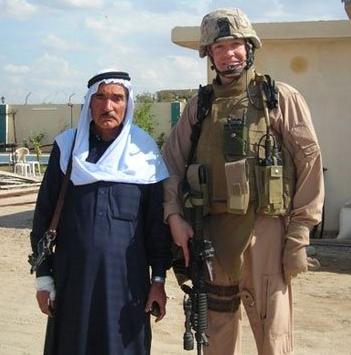Paramount sheikh of the Albu Issa survives assassination attempt
 |
| Sheikh Khamis al-Hasnawi and a US Marine outside Fallujah in March 2007. |
On August 23, Aswat al-Iraq reported a failed assassination attempt on Sheikh Taleb al-Hasnawi. Taleb is a powerful sheikh of the Albu Issa, one of the most significant tribes around Fallujah:
“An IED emplaced on a roadside in the village of Ahsi went off near the motorcade of Sheikh Taleb al-Hassanawi, a senior chieftain of the al-Bu Issa clans, in Amiriyat al-Falluja district,” a police source in Falluja told Aswat al-Iraq news agency.“Hassanawi survived the attempt unscathed but three of his guards were wounded and two vehicles of his motorcade were damaged,” the source added.
I’ve learned from sources that it was actually Sheikh Khamis al-Hasnawi who was targeted, and that no one was hurt. Sheikh Khamis is the “Paramount Sheikh,” which is the titular leader of all the 12 subtribes that fall under the collective umbrella of the “Albu Issa tribe" that administers the 80-square-kilometer Peninsula south of the city of Fallujah.
The most likely suspects: members of southern subtribes located in the Ameriyah/Fuhaylat/Abu Hasa area who are affiliated with al Qaeda in Iraq (AQI). Members of American-allied subtribes I’ve spoken to regard the resurgence of al Qaeda as a feared and likely scenario as Americans pull back from day-to-day security in Anbar. A Marine quoted by Thomas Ricks back in late June disagrees, and echoes the assessment of other American advisers I've spoken to. The generic adviser consensus I've heard (admittedly, sample of three) is that the Sunni-Sunni violence in Anbar will not spiral to unmanageable or historically exceptional levels:
Despite recent reporting, the area is stable, while still not completely safe. The attacks mentioned in the article are not part of a mounting trend, but are normal and to be expected from time to time in this environment. If we want Iraq to return to normal it will necessarily mean making itself more vulnerable to these kinds of attacks.But we have taken it as far as Americans can. In my opinion, anything we do now may do more harm than good in delaying the inevitable and reinforcing their, at times, crippling malaise. The only enduring role for Americans is to provide the safety net to prevent complete collapse, chaos, and civil war; three things that I do not believe will happen in any event.
That said, locals I've talked to express dire feelings about AQI's prospects for resurgence.
I lean toward the above-quoted Marine's position, because AQI has such large odds stacked against them. Much of the pre-war tribal order has been reinvigorated, the Iraqi Security Forces are functioning better, and AQI's name is mud, denying them the chance at the broad support, then toleration, and eventual intimidation advantages they once enjoyed.
AQI remains a threat; they can make life difficult and stage the occasional hit or spectacular attack. But they have little prospects for exerting anything near the murderous influence they once did, and their depredations have injured the larger organization's reputation. Who al Qaeda in Iraq was and remains is complex, and will be the subject of a forthcoming post.
